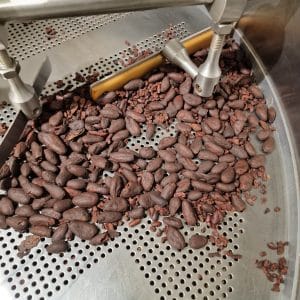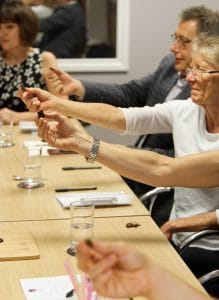- 1 day
- Mon 6 Oct 2025
- 10:00am - 6:00pm
- Artisan HUB - Humans United in Business, Bucharest, Romania
- €185 (€152.89 + VAT *)
Can you identify the roast of a chocolate just by it’s aroma? Ever wonder why your bar made with an origin cacao does not have the bright fruity floral notes of another bar made with the same cacao? Roasting Sensory will help chocolate makers and tasters understand the impact of different roasting approaches, including tasting cacao, and retail and lab chocolate.
* 21% TVA/VAT included for all bookings
Join our new roasting module, hosted in our Bucharest learning center at Artisan HUB
YOU CAN ALSO VISIT THE CRAFT CHOCOLATE ZONE AT SLOW COFFEE, 3-5 OCTOBER
Cacao roasting is one of the most important steps in chocolate making and can have a huge impact on the final flavour notes of a chocolate. Cacao from same origin, harvest and lot can taste completely differently according to the roasting profile chosen by the chocolate maker.
Meanwhile, the industry standard for roasting cacao for commercial chocolate is to use a high or intense roasting profile to cover defect notes and create a basic ‘chocolate’ flavour.
Fine, craft bean-to-bar chocolate tends to use much lower roasts to preserve good flavour in fine cacao, but there is still a tendency to follow traditional industrial approaches to roasting, resulting in over-roast or burnt notes in the finished chocolate and creating a short or unpleasant finish.
Understanding the influence of roasting is essential for new and existing chocolate makers to get the best out of their cacao and for chocolate tasters who want a real understanding of roast in chocolate.
Explore our other upcoming courses in Bucharest:
- Certificate in Cacao Evaluation and Flavour Profiling course – 29 September – 2 October
- Chocolate Defect Recognition module – 7 October
Craft Chocolate Zone at Slow Coffee – RomExpo, 3-5 October, Bucharest, Romania
Our Bucharest coffee friends Artisan HUB are holding their first expanded edition of the Slow Coffee festival at one of Bucharest’s premier exhibition locations, RomExpo. The festival will feature a Craft Chocolate Zone jointly hosted by the new Romanian Craft Chocolate Association and IICCT Romania.
The festival will be a great chance to explore Romania’s world class specialty coffee scene and to explore the growing Eastern European fine chocolate movement, featuring exhibitors from Romania and international craft chocolate makers.
Please contact us if you’re interested in exhibiting (more details coming soon).
Roasting Sensory Development modules
This sensory development module will help to widen your chocolate tasting experience and develop your personal flavour ‘archetypes’ for different roast profiles, including low, high, under and over-roast flavour recognition.
The module will explore how roast affects flavour through comparison tasting of commercial chocolate, where high-roast is the norm, with tasting of craft chocolate origin bars. The course will include chocolate samples made with cacao from different origins to help develop your understanding of how roast can change flavour delivery, balance, preservation of fruity and floral notes and aftertaste in craft chocolate.
This module is supplemental to our Chocolate Tasting program and will form part of the learning development that will be used for our more advanced level programs.

- Roasting theory and affect of different roasting equipment
- Tasting of high, medium and low roast chocolate
- Comparison of chocolate samples made with different roasting profiles
- Tasting of different roasts of the same origins, in cacao and chocolate
- Practice at identifying roast profiles through chocolate aroma and taste
- Review of roasting in other fine food or drink areas, such as coffee

- Anyone wanting to taste and understand roasting in chocolate
- Chocolate makers who want to develop or improve their chocolate
- Chocolate tasters who want to expand their knowledge and understanding of chocolate making
- IICCT Alumni continuing their chocolate knowledge journey
- Professionals or individuals interested in chocolate production and recipe development
